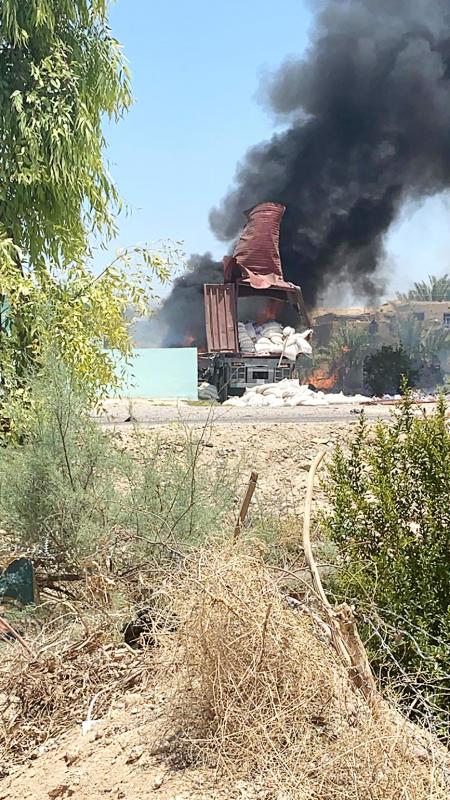Three rockets yesterday were fired at the US embassy in Iraq, the Iraqi army said, at the end of a day marked by rocket and drone attacks on bases hosting US forces in Iraq and Syria.
The embassy itself was not hit, but three nearby places in Baghdad’s heavily fortified Green Zone were, the Iraqi army said.
A spate of recent attacks on US military and diplomatic facilities in Iraq has been blamed on pro-Iranian armed groups within a state-sponsored paramilitary force.

Photo: AFP / BAGHDAD OPERATIONS COMMAND
US forces, which have 2,500 troops deployed in Iraq as part of an international coalition to oppose the Islamic State (IS) group, have been targeted almost 50 times this year in the country, but the past few days have seen an increase in the frequency of attacks.
On Wednesday, fourteen rockets were fired at an air base hosting US troops in Anbar Province, causing minor injuries to two personnel, the coalition said.
A Shiite militant group called Revenge of al-Muhandis Brigade claimed responsibility and vowed to defeat the “brutal occupation,” said the US-based SITE intelligence group, which monitors militant groups.
The militant group is named after Abu Mahdi al-Muhandis of Iraq’s Hashed al-Shaabi paramilitary alliance, who was killed in a US drone strike early last year along with Iranian general Qassem Soleimani, SITE said.
Late last month, the US carried out airstrikes against pro-Iran fighters in Iraq and Syria.
The rockets on Wednesday “landed on the base & perimeter” of the Ain al-Assad base, coalition spokesman Wayne Marotto wrote on Twitter, adding that local homes and a mosque were also damaged.
Iraqi security forces said that the rocket launcher had been hidden inside a truck carrying bags of flour.
Similar attacks happened earlier this week.
On Monday night, US forces shot down an armed drone above the embassy, Iraqi security officials said.
US defense systems fired rockets into the air in the capital, reporters said, with Iraqi security sources saying the salvos had taken out an explosive-laden drone.
Just hours earlier, rockets had also been fired toward Ain al-Assad.
Asked about the renewed violence, US Department of State spokesman Ned Price told reporters that the “attacks reflect and are representative of the threat that Iran-backed militias present fundamentally to Iraq’s sovereignty and to Iraq’s stability.”
Across the border in Syria, where pro-Iran fighters have fought alongside the Damascus regime in the decade-old civil war, Kurdish-led forces also reported attempted attacks near a coalition base.
The US-backed Syrian Democratic Forces said that they repelled drone attacks near the base in the Omar oil field in the country’s east, in the second such operation in days.
“Our frontline forces against IS and coalition forces in the area of the Omar oil field dealt with drone attacks,” the Syrian Democratic Forces said, adding that the drones had caused no damage.
The Syrian Observatory for Human Rights, a Britain-based war monitor with sources inside Syria, said that pro-Iran militias had probably launched the drones from a rural area outside the town of al-Mayadeen southwest of the oil field.
It was the second such attack in days, after the Syrian Democratic Forces reported “two unidentified rocket-propelled grenades landed on the western side of the Omar oil field” late on Sunday, which caused no casualties.
Pro-Iranian militias also fired several shells at Omar on Monday last week, causing damage but no casualties, the observatory said.
The US had launched airstrikes the previous night against three targets that it said were used by pro-Iran groups in eastern Syria and western Iraq.
The observatory said that at least five “Iran-backed Iraqi militia fighters” were killed in the strikes on the Syrian side of the border.

‘IN A DIFFERENT PLACE’: The envoy first visited Shanghai, where he attended a Chinese basketball playoff match, and is to meet top officials in Beijing tomorrow US Secretary of State Antony Blinken yesterday arrived in China on his second visit in a year as the US ramps up pressure on its rival over its support for Russia while also seeking to manage tensions with Beijing. The US diplomat tomorrow is to meet China’s top brass in Beijing, where he is also expected to plead for restraint as Taiwan inaugurates president-elect William Lai (賴清德), and to raise US concerns on Chinese trade practices. However, Blinken is also seeking to stabilize ties, with tensions between the world’s two largest economies easing since his previous visit in June last year. At the

UNSETTLING IMAGES: The scene took place in front of TV crews covering the Trump trial, with a CNN anchor calling it an ‘emotional and unbelievably disturbing moment’ A man who doused himself in an accelerant and set himself on fire outside the courthouse where former US president Donald Trump is on trial has died, police said yesterday. The New York City Police Department (NYPD) said the man was declared dead by staff at an area hospital. The man was in Collect Pond Park at about 1:30pm on Friday when he took out pamphlets espousing conspiracy theories, tossed them around, then doused himself in an accelerant and set himself on fire, officials and witnesses said. A large number of police officers were nearby when it happened. Some officers and bystanders rushed

Beijing is continuing to commit genocide and crimes against humanity against Uyghurs and other Muslim minorities in its western Xinjiang province, U.S. Secretary of State Antony Blinken said in a report published on Monday, ahead of his planned visit to China this week. The State Department’s annual human rights report, which documents abuses recorded all over the world during the previous calendar year, repeated language from previous years on the treatment of Muslims in Xinjiang, but the publication raises the issue ahead of delicate talks, including on the war in Ukraine and global trade, between the top U.S. diplomat and Chinese

RIVER TRAGEDY: Local fishers and residents helped rescue people after the vessel capsized, while motorbike taxis evacuated some of the injured At least 58 people going to a funeral died after their overloaded river boat capsized in the Central African Republic’s (CAR) capital, Bangui, the head of civil protection said on Saturday. “We were able to extract 58 lifeless bodies,” Thomas Djimasse told Radio Guira. “We don’t know the total number of people who are underwater. According to witnesses and videos on social media, the wooden boat was carrying more than 300 people — some standing and others perched on wooden structures — when it sank on the Mpoko River on Friday. The vessel was heading to the funeral of a village chief in